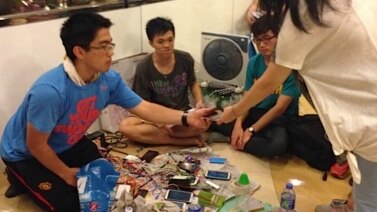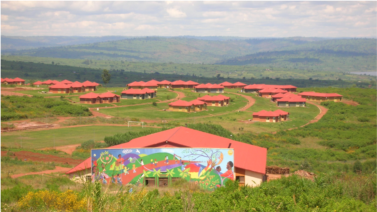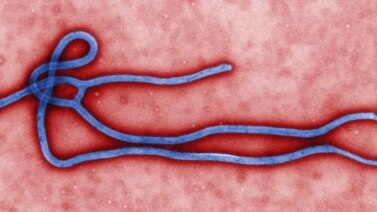
From VOA Learning English this is As It Is.
Welcome back. I’m Caty Weaver.
And I’m Kelly Jean Kelly.
Every year the non-profit organization Transparency International reports on corruption around the world. This year’s report shows strong progress in some African countries. But there are worrying findings as well, especially in countries where there is civil conflict.
“You find a closing down of the transparency in government and in particular you find a complete lack of accountability.”
Transparency International’s look at corruption around the world: that is our subject today on As It Is.
The Berlin, Germany based non-profit Transparency International releases its Corruption Perception Index each year. A score of 100 is linked to a complete lack of corruption. So the higher a country scores, the better.
For 2013, the group questioned thousands of people in 177 nations. It asked for their opinions about the level of corruption in their countries. The results show strong progress in some African states. But it also shows high levels of abuse of power in Syria, Afghanistan and other countries where there is conflict. Somalia, Afghanistan and North Korea each scored just eight points out of 100.
Transparency International released the report December 3. The next day, Somali lawmakers in Mogadishu voted to oust the government. The government had been involved in a power struggle involving accusations of favoritism and tribal politics. The Somali government is also fighting the Islamist militant group al-Shabab.
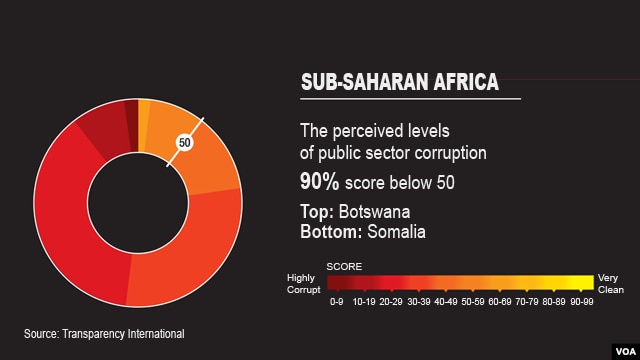
Robert Barrington is the Executive Director of Transparency International – United Kingdom. He says the worst performers in the index are usually countries where there is conflict.
“You find a closing down of the transparency in government and, in particular, you find a complete lack of accountability. The institutions of the state start to dissolve. And it’s the citizens that suffer.”
Almost three years of civil war in Syria have caused it to fall further in the corruption index. It is 10th from the bottom of the list. Iraq is also in the bottom 10, as is Afghanistan.
Ukraine is rated 144th on the index. It is one of the worst in its geographical area, which includes Europe, Russia and most former Soviet Union states.
Recently protesters in Ukraine have again demonstrated in the streets to try to force the government to hold new elections.
Robert Barrington says sometimes police forces cannot be trusted.
“In some countries, in most countries, you would hope that when you go to the police, they are your allies in the fight against crime. But in many countries, you actually find they are your enemies in the fight against crime. They are themselves the criminals.”
You are listening to As It Is from VOA Learning English.
(MUSIC)
Mr. Barrington notes some hopeful news in the report. For example, he says Rwanda performed poorly on the corruption index for several years. Now, he says the country is rising, thanks to an intensive government effort to fight corruption.
And just ten years ago Liberia was struggling with a bloody civil war. Now, the economy is healthy, with more than 10 percent growth in the amount of goods and services last year. And Liberia came in 83 out of 177 countries in Transparency International’s index. That is a good place compared to much of the rest of Africa. However, some experts say corruption is still holding back Liberia’s success.
(SOUND)
That is Liberian author Robtel Pailey reading from a children’s book she wrote about corruption. The title means trickery.
Ms. Pailey is also a PhD researcher at London University’s School of Oriental and African Studies. She says corruption in Liberia has deep roots.
“In the private sector, it happens in the markets. It happens in the schools. It happens in the government. So I would certainly argue that it is entrenched, and I think it is a common phenomenon, that people have accepted as being entrenched. So that, it's an open secret. That's about corruption is entrenched in Liberia.”
Ms. Pailey says ending corruption in Liberia would require a new way of thinking in the country.
“I think in many ways Liberians think of corruption as about a way to get ahead of the system, a way to bypass the system.”
The best performers in Transparency International’s 2013 index were New Zealand and Denmark. The United States was 19th on the list.
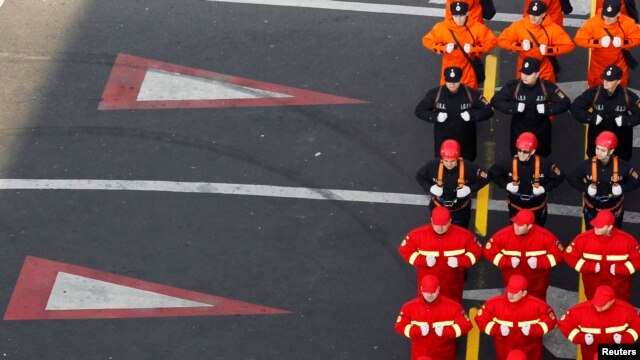
Finally, Romania scored 43 on the Corruption Perceptions Index this year. That is a fall of one point over its 2012 score. The country placed 69 out of the 177 countries.
But, on Tuesday, the Romanian lawmakers voted to protect themselves from legal action in corruption cases. The constitutional amendments would block investigation of parliament members and other top politicians and lawyers.
Transparency International Romania has publicly protested the parliamentary action and demanded that the laws be examined by a court.
Romaninan President Traian Basescu has said he would not sign the law although he would be included in the legal protection it offers. He told reporters that the move was a step backwards for Romania.
I’m Kelly Jean Kelly.
And I’m Caty Weaver. Thanks for joining us today on As It Is.
You can find podcasts and pdfs and test your English skills on our website, learningenglish.voanews.com. You can also tell us what you would like to hear about on As It Is or any Learning English program. Leave us a message by clicking on the Contact Us link on the website. Or send an email to learningenglish@voanews.com.
And remember to listen at the beginning of the hour for the latest world news on the Voice of America.
